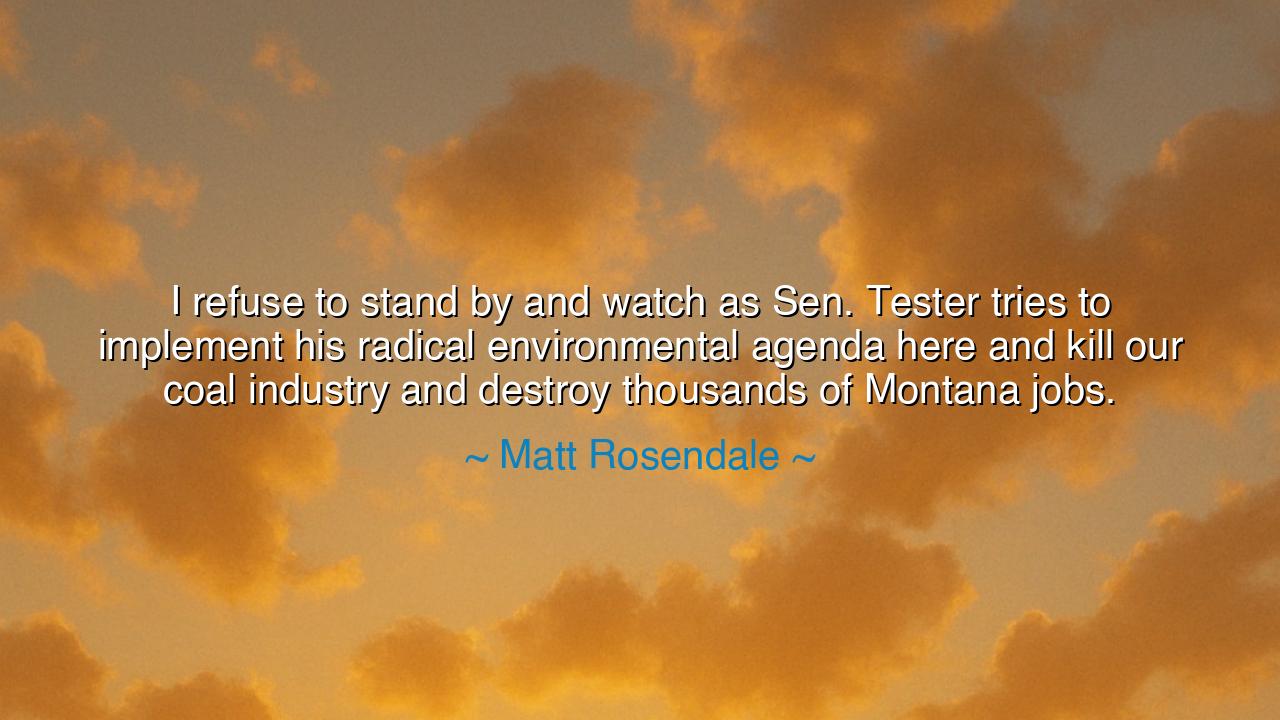
I refuse to stand by and watch as Sen. Tester tries to implement
I refuse to stand by and watch as Sen. Tester tries to implement his radical environmental agenda here and kill our coal industry and destroy thousands of Montana jobs.






Hear the words of Matt Rosendale, spoken with the fire of conflict and the weight of his people’s livelihood: “I refuse to stand by and watch as Sen. Tester tries to implement his radical environmental agenda here and kill our coal industry and destroy thousands of Montana jobs.” These are not idle syllables, but a cry forged in the crucible of politics, economy, and survival. It is the voice of one who sees his land not only as soil and sky, but as the lifeblood of families whose bread and shelter depend upon the black stone of the earth—coal.
The meaning of the words lies in the eternal clash between industry and environment, between the old power that fueled nations and the new vision that seeks to protect the earth. Rosendale speaks as defender of the coal industry, which for generations has been the backbone of Montana’s working class. He portrays himself as guardian against change he calls radical, fearing that the pursuit of environmental purity may cast into despair the miners, the haulers, and the families whose livelihoods are tied to the veins of coal beneath the mountains. His refusal to “stand by” carries the weight of warrior’s oath: to resist what he sees as destruction disguised as reform.
This struggle is not new in human history. Consider the Luddites of 19th-century England, who smashed machines not out of hatred for progress but out of desperation, fearing that the new looms would rob them of their bread. To the lords and rulers, they were rebels against the march of industry; to themselves, they were protectors of family and tradition. So too in Montana, Rosendale casts the environmental vision as a threat to community stability. Whether just or unjust, his words reveal the fear that when change comes swiftly, it is often the poor and working class who bear the greatest burden.
Yet, history also tells of the dangers of clinging too tightly to the past. The great city of London once choked under blackened skies, its people coughing from the smoke of coal that had powered its rise. Only through painful reforms, bans, and cleaner technologies did the city breathe again. Thus, the wisdom of environmental agendas is not without merit: they are born of the knowledge that unchecked exploitation of the earth may bring prosperity in the short term but ruin in the long. In this tension between Rosendale and Tester lies the eternal debate: how to balance human need with the earth’s survival.
The lesson, O listeners, is not to take sides blindly but to see clearly: both industry and environment demand respect. To destroy coal without providing new paths for those who depend on it is cruelty. To ignore the earth’s cry under the weight of smoke and fire is folly. Leaders must not only speak of protecting jobs, nor only of protecting nature, but of crafting the bridge that allows communities to cross from old industries to new, without falling into despair.
What then must we do? As citizens, we must demand solutions that honor both worker and world. Support policies that bring new industries to coal country, that retrain workers, that make clean energy not an enemy but an ally of those who once mined the earth. Speak with compassion for the laborer while standing firm for the forests, rivers, and skies. Refuse to let the debate be framed as destruction of one side or the other, for wisdom seeks harmony, not endless war.
And to the children of Montana, and of all lands built upon coal, remember this: your worth is not bound to a single stone or industry. The strength of your hands and the fire of your spirit can forge new livelihoods, if leaders have the vision to guide you there. Demand that vision. Demand a future where neither jobs nor the earth are sacrificed upon the altar of shortsightedness.
Thus, let Rosendale’s words stand as a lesson—not only of resistance, but of the deeper truth: whenever nations shift from one age of power to another, the cries of fear will be loud. But those who walk wisely will honor both people and planet, crafting a future in which prosperity and preservation walk hand in hand.






AAdministratorAdministrator
Welcome, honored guests. Please leave a comment, we will respond soon